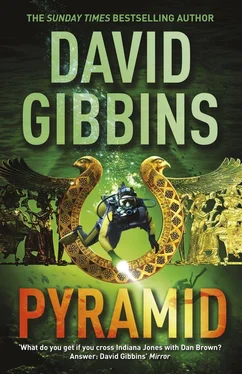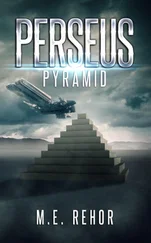Aysha nodded. “That might just work, Jack. It’s about the only leverage we’ve got.”
Jack thought hard for a moment longer. There was nothing else they could do, bar storming the ministry and demanding her release, something that would almost certainly get them arrested or worse. “All right. Let’s see what you’ve got.”
Maria looked at him. “We enlarged the hole that Sahirah created as much as we could, but it’s still barely big enough to get your arm into. It’s a crack in the fabric of the wall that seems to have been overlooked when the synagogue was restored in 1890 and then again a few years ago, probably because the opening that had once existed had become bunged up centuries ago with congealed vellum and other organic matter. Countless generations of mice dragged bits of manuscript into the hole and shredded it to make their nests, so nothing of paper or papyrus has survived beyond a few tiny shreds. But what we do have is some larger pieces of vellum. It seems the mice didn’t like something about the vellum, perhaps the gum used to stabilize and dry the gall ink. In time those fragments became glued with mouse droppings to the interior of the hole, actually helping to insulate the nest. When Sahirah showed us the few postage-stamp-sized fragments that she managed to prize out, we got really excited because vellum generally was used for religious texts, so there was a chance of it being something really important. After I saw her photos in the email, I booked the first flight here.”
Jack pointed at a matte of tissue covering something on the table. “Have you got a fragment here?”
Maria sat down on the chair and raised the tissue. Beneath it was a piece of vellum about half the size of a standard book page. It was torn along one edge and filthy. “Partly the dirt is centuries of mouse droppings and body decay, a kind of congealed stickiness,” she said. “And partly it’s the spread of ambient ink from the lettering, as well as moisture stains that look almost like burning. After I’ve cleaned this back in the lab and put it under the electron microscope to check the gall ink stability, I’ll put it in a humidification chamber to give the leather back its suppleness, and then strengthen it with methycellulose and starch paper. But even without cleaning, you can still make out the words.”
Jack leaned closer, but then recoiled. “That’s a serious stench,” he said, crinkling his nose. “I think I need a gas mask.”
Maria gave him a rueful look. “Nice, isn’t it? Nine hundred years of mouse. Solomon Schechter was never the same after the months he spent in here. His health was broken. He took to wearing a mask when he studied the manuscripts in Cambridge, but it was probably too late, and ultimately that fetid exposure was what killed him.”
“Nine hundred years,” Jack murmured, staring again. “That makes it early- to mid-twelfth century. Have you managed to transcribe it?”
“Take a close look first. What do you see?”
Jack held his breath, stared closely, and then backed off again. “Hebrew letters, about seventeen lines, broken off at the bottom as if the lower part of the page is missing.” He held his breath again, and peered closely. “My God. I thought so. It’s a palimpsest. I can see older letters floating under the upper text, upside down. I can’t make out the words, but the letters have Hebrew-style serifs as well.”
Maria nodded. “At the moment I can’t translate the lower text. That’s a prize that awaits us back in the lab. I’m hoping against hope for more lines of the Ben Sira, the Book of Wisdom, which is probably the greatest single treasure to come out of the Geniza.”
“Lanowski talked about that this afternoon. About the problem of translation and transmission in sacred texts, and the importance of finding the Hebrew originals.”
“I talked it through with him as well on the phone. He’s had some startling ideas. He follows many scholars in thinking that Joshua Ben Sira in the second century BC composed the book in Alexandria. But he’s taken it one step further and suggested that the great library of Alexandria, newly established at that time, would have allowed Ben Sira ready access to many of the surviving books of wisdom from Pharaonic Egypt, texts that mostly didn’t make it through the destruction of the library in late antiquity and are therefore unknown to us. Both he and Professor Dillen think there’s enough in what we know of the Ben Sira to suggest a Pharaonic link, though they need more original text to make a case for it. Maybe we’ve got it here; it’s tantalizing, but a brick wall at the moment. What I’m really interested in now, what I’ve got you here for, Jack, is the upper text. Has Aysha prepped you on this?”
“Only that it’s something to do with Al-Hakim bi-Amr Allah, the eleventh-century caliph of Egypt.”
“Okay. Al-Hakim ruled from 996 to 1021. This is a letter written about a hundred and twenty years after his death, by Yehuda Halevi.”
“The Jewish poet?” Jack exclaimed. “I know that the Geniza contained one of the richest archives of letters from him.”
Maria nodded. “More than fifty of them. He’s one of the most celebrated poets of medieval Judaism. He was Sephardic, from Spain, and had a wide circle of friends there and among the Jewish diaspora around the Mediterranean. He came on a pilgrimage to the Holy Land in 1140, in the last year of his life, arriving in Alexandria in September of that year, probably alighting near the site of the ancient lighthouse at the very spot where you left the institute this afternoon. After several months in Cairo, he finally left on the eleventh of May 1141 for Jerusalem, where his trail is lost to history. Under the Crusaders, neither Jews nor Muslims were allowed into the city, but pilgrims like Halevi were allowed to pray at the Mount of Olives. Perhaps he died there after fulfilling his dream. He’s another shade from the past you can imagine standing on the floor of the synagogue, Jack. In fact he had quite a lot in common with General Gordon and his circle. Like them, Halevi had become convinced that religious fulfillment could be found only in the Holy Land. He lived at the time of the First Crusade, when Baldwin the Third was King of Jerusalem, and also when the Jewish community in Spain was caught between Christianity and Islam.”
“Your own ancestors, I remember.”
Maria nodded. “They were forced to convert to Christianity and adopt Christian names to avoid the Inquisition, eventually losing their Jewish identity. But I have a huge diaspora of distant cousins who chose to flee, to England, to Holland, to Constantinople, to the New World, even here to Cairo, readopting names like Sarah and Rebecca and Moses and Abraham. Handling this document from the twelfth century gives me a strange feeling, as if that Jewish identity had been lying dormant in my family for all those generations since the conversion, and not been extinguished after all.”
“They say you can never lose it,” Aysha murmured.
“And there’s something else. Like those soldiers in the late nineteenth century, Halevi also turns out to have had a fascination with what we would now term archaeology.”
“That’s what’s in this letter?”
Maria nodded. “It’s a fantastic addition to the archive. His feathery hand is instantly recognizable, and it’s incredibly exciting for me to be holding this. It’s actually Arabic, but written in Hebrew letters. The Geniza represents a rich fusion of Arabic and Jewish traditions, evidence of a cosmopolitan world far removed from the version of history peddled by the preachers of hate who indoctrinate the extremists. Halevi had been influenced in Spain by Islam just as the Jews had been in Cairo, and had come to believe that Arabic forms of expression could mediate Jewish thought, in poetry and in prose.”
Читать дальше












